Showing 61–72 of 77 results
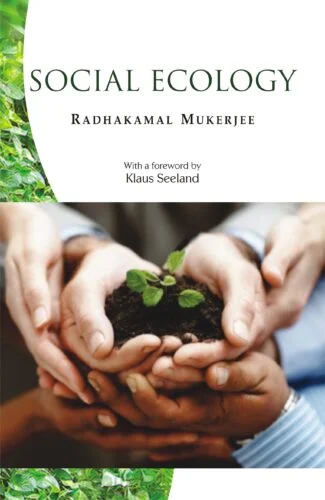
This volume is an endeavour to present the major ecological concepts and processes which may help in refashioning the framework of sociology. It is also an attempt to deal with a comparative social ecology on which rest the foundations of comparative economics and sociology.
This book of Radhakamal Mukerjee, with an introduction of Klaus Seeland, is an authoritative study on social ecology. Social ecology is different in scope from human ecology. Since there is whole gamut of confusion about the term social ecology and its relation with sociology, here is an attempt to detail the essential principles of social ecology and its scientific fruitfulness for sociology.
This volume is an endeavour to present the major ecological concepts and processes which may help in refashioning the framework of sociology. It is also an attempt to deal with a comparative social ecology on which rest the foundations of comparative economics and sociology. Social ecology studies the place, occupation and time relations of persons and groups in their processes of competition, co-operation, conflict, accommodation and succession. It is a vast and virgin field orienting social phenomena on the basis of the give-and-take between life, mind and region.
This book is so comprehensive that it should contribute to a scientific classification of socialecological concepts and to the development of a methodology according to which social economy may form the basis of a new functional and quantitative sociology. Therefore, it should be a referral book for sociology students, teachers and researchers.
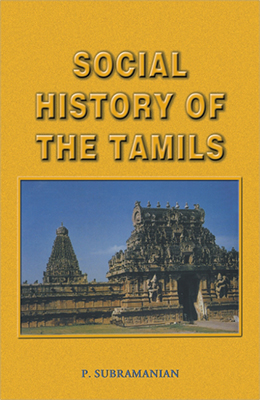
The book offers an account of the Tamils society, economy, religious beliefs, educational mechanisms, arts and cultural expressions (during 1707-1947). It also discusses the profound influence of colonial rule in the tradition-bound Tamilian society.
Notwithstanding the prolificity of indepth researches in contemporary historiography, Professor Subramanian’s book is the first concentrative effort to track down the social history of the Tamils. Today, the Tamils, over fifty million of them, live in the south-eastern state of the Indian peninsula: Tamil Nadu — which indisputably represents the very nucleus of millennia-old Dravidian culture in India. The book offers a compelling account of the Tamils’ society, economy, religious beliefs, educational mechanisms, arts, and cultural expressions during the years 1707-1947 — when, significantly, the British domination blossomed, bloomed, and faded; when new thoughts, new ideas, and new ways of life came as irresistibly into the homeland of the Tamils as into the Indian subcontinent. Thus retracing over two centuries of the ‘British connextion with India’, the author here tries to show how the long colonial rule in India exposed the tradition-bound Tamilian society to Western influences — with results that proved incalculable in both their range and depth. Social History of the Tamils : 1707-1947 is the outcome of Professor Subramanian’s decade-long, painstaking research, authenticated by an astonishing mass of evidence including archival records, Jesuit sources, Modi (Maratha) manuscripts, newspapers’ reports, biographies, travelogues, literary writings, and even fictional works.

The book offers an account of the Tamils society, economy, religious beliefs, educational mechanisms, arts and cultural expressions (during 1707-1947). It also discusses the profound influence of colonial rule in the tradition-bound Tamilian society.
Notwithstanding the prolificity of indepth researches in contemporary historiography, Professor Subramanian’s book is the first concentrative effort to track down the social history of the Tamils. Today, the Tamils, over fifty million of them, live in the south-eastern state of the Indian peninsula: Tamil Nadu — which indisputably represents the very nucleus of millennia-old Dravidian culture in India. The book offers a compelling account of the Tamils’ society, economy, religious beliefs, educational mechanisms, arts, and cultural expressions during the years 1707-1947 — when, significantly, the British domination blossomed, bloomed, and faded; when new thoughts, new ideas, and new ways of life came as irresistibly into the homeland of the Tamils as into the Indian subcontinent. Thus retracing over two centuries of the ‘British connextion with India’, the author here tries to show how the long colonial rule in India exposed the tradition-bound Tamilian society to Western influences — with results that proved incalculable in both their range and depth. Social History of the Tamils : 1707-1947 is the outcome of Professor Subramanian’s decade-long, painstaking research, authenticated by an astonishing mass of evidence including archival records, Jesuit sources, Modi (Maratha) manuscripts, newspapers’ reports, biographies, travelogues, literary writings, and even fictional works.
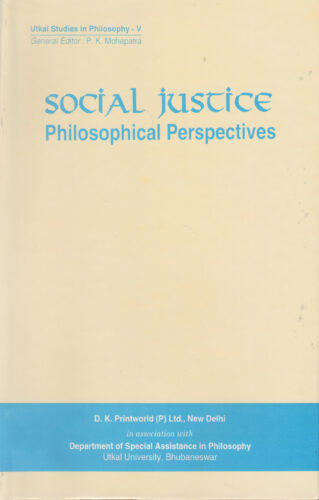
These essays look afresh at the varying connotations of Social Justice in its moral, legal, economic, political and historic perspectives. They consider social justice vis-a-vis democracy, gender questions, justice-making mechanisms, retribution and the Hindu Karma.
Civilisational history, in a way, has been mans unending quest for social justice, leading him to strive not only for equality, but also for the abolition of discriminations in every form. Social justice, however, has defied a precise definition. And, as a concept, has been viewed differently in different contexts dependent, as it has been, on the contigencies of time, place and person. Here is a multi-author work trying to sharpen the readers understanding of social justice against the backdrop of its diverse concepts across the ages. An assemblage of 15 insightful essays, each written by a reputed scholar, the book looks afresh at the varying connotations of Social Justice, in all its essential perspectives: moral, legal, economic, political and historical. Attempting, thus, to visualise its concept, the authors consider social justice vis-a-vis democracy, gender questions, justice-making mechanisms, retribution, and even the Hindu doctrine of karma. Of special interest to readers is the analysis, by some authors, of the Indian experiments of social justice in extending preferential treatment to members of the exploited classes and evaluate its impact on the Indian society in general and on the preferred classes in particular. Volume 5 in the Utkal Studies in Philosophy series, this collection is an important contribution not just to the ever-continuing dialogue on social justice, but to Analytical Philosophy of Values as well. Social thinkers/activities, sociologists, social scientists, and, more specially, the scholars of philosophy will find it a useful acquisition.

The book unveils the ancient Indian society in all its variegated evolutionary expressions across 2500 years to explore the sociological orientations of the Vedic Samhitas, Brahmanas, Upanisads and other Sanskrit works besides Buddhist and Jaina works.
It is a fascinating, meticulously documented study unveiling, for the first time, the ancient Indian society in all its variegated evolutionary expressions across about two-and-a-half millennia: since the Vedic times (c. 1500 BC) with a beautifully well-knit account of its religions and cultic practices; economic paradigms; polity and statecraft; educational set-up; customes, manners, etiquettes; food habits, drinks, dress styles; sports, pastimes, modes of recreations; sex life and sexual morality; casteist hierarchies; attitude towards women; and its crimes, punishments and legal codes. Epitomising a lifetime of Dr. Banerjis research on ancient India, the book vividly captures all different articulations of sociological import from a whole body of traditional writings: both sacred and secular. Again, it turns out to be the first ever study to singly explore the sociological orientations of the Vedic Samhitas, Brahmanas, Upanishads, Kalpasutras, Vyakaranas, Puranas, Smritishastras, Tantric texts, the Ramayana, the Mahabharata, Kautilyas Arthashastra, and many other Sanskrit classics besides Buddhist and Jaina works in Pali, Prakrit and Apabhramsha languages. With highly informative appendices, extensive bibliographic references and a glossary of technical/unfamiliar words, the book holds out enduring appeal to both scholars and discerning readers.
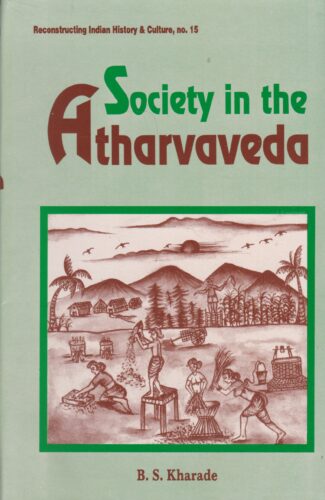
The Atharvaveda delineates the life of the common man in ancient Indian village community. The book focuses on farming and cattle breeding, crafts, religion, daily preoccupations and fashions, role of women and their problems, etc.
Of the Vedas the Atharvaveda, the Veda of the masses, is unique. Unlike the Rig, Sama and Yajur Vedas, the Atharvaveda delineates the life of the common man in the ancient Indian village community the village farmer, craftsman and others who formed the core of the agriculturist society of the time. Modern scholarship has focused much on the vedatrayi but little has been written on the Atharvaveda. Society in the Atharvaveda not only attempts to address the dearth of scholarly studies on the Atharvaveda but it is also perhaps, in recent years, the first ever study of the Atharvaveda from the point of view of the common people. The Atharvavedic verses throw light upon a wide range of themes and all these are discussed here: topics from farming and cattle breeding, village crafts, religion, daily preoccupations and fashions of the people, role of women and their problems in day-to-day life, crime and degenerative practices like adultery and gambling, to trade and travel means and routes, loan facility, taxation, political administration and mans response to his environment. The author traces this Veda as the source of many traditional folk songs that are sung even today by the common man at work in the villages. This systematic survey dispels the widespread notion that the Atharvaveda is subordinate to the vedatrayi; rather the author shows that it occupies an unrivalled importance in Vedic literature largely owing to its preoccupation with the life of the people at large. The book abounds with Atharvavedic verses; a number of verses are cited to bring out each and every aspect of common life and living. With meaningful appendices, this scholarly work would provide interesting and useful research and reference material to Vedic scholars especially those keen on studying the Veda of the masses in a fresh perspective.
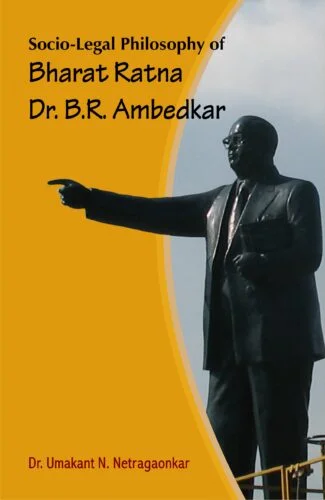
An in-depth study of Dr Babasaheb Ambedkar’s life, his social and economic philosophy, contribution to social justice, his struggle for rights of weaker sections in society, and his thoughts on the legal system of India, particularly human rights and equality of all peoples.
An in-depth study of the thoughts of Babasaheb Ambedkar on the social, economic and legal system of India, this book examines the relevance of Ambedkars thoughts today when societies have disparities and are going through conflicts. It deals with aspects of Ambedkars life, his social and economic philosophy, contribution to social justice, and his struggle for rights of weaker sections in society.
The volume deals with the social condition and political rule in the pre-Buddhist era and later till the sixth century ce, the origin and flourishing of the caste system in ancient times, and untouchability. It explores the meaning of some basic terms like justice. It views the Constitutional provisions regarding ensuring equality of all peoples and abolition of untouchability and explains how Ambedkar helped to establish the Constitutional rights of the SCs and the STs and the backward classes. A special focus is on the reservation issues and the judicial stand on them. It showcases the Supreme Court of Indias reinterpretation of Ambedkars vision and philosophy of social justice in its decisions concerning reservation. It throws light on the new concept of social justice that the judiciary has emphasized over the decades with stress on positive human rights.
The Bodos (Kacharis) constitute a very important group of Indo-Mongoloid (Tibeto-Burman) people of north-east India. They are concentrated in various parts of Assam, and are considered to be one of the earliest settlers of Assam, who had built powerful kingdoms in various parts of north-east India. This book attempts to trace the history of these tribal people, their glory during the medieval period, their fall during the Mughal rule and their efforts to awaken during the British Raj. The Bodos were illiterate, slothy due to their fondness for drinking jou (rice beer), reared pigs, lived in unhealthy surroundings, which led them to be labelled as untouchables by the upper caste Hindus. Persistent and path breaking efforts made by their renowned educational, cultural and social reformer Gurudevkallicharan Brahma bore fruit and many changes were brought in the Bodo way of living, customs, religion, habits. Notable among them were his efforts to motivate his people to discard their old religion and convert to a new religion called Brahma dharma. He was instrumental in spreading literacy by convincing the colonial authorities to open schools, and in starting a magazine called Bibar. Moreover, his pioneering role in launching various unions among the Bodos is laudable. This book is a veritable ‘must read’ for all those who wish to know about the Bodos and the socio-religious-cultural transformation that took place in them and a new dawn that they had entered into.

This book is the first attempt at a systematic cultural-anthropological study of the stonemill tradition the grinding of the peasant women who singing for ages on their hand-mills have articulated tradition in their work-songs.
Tangible patrimony usually attracts attention and efforts of preservation. Intangible cultural traditions do often go with the winds of history when their social and material setting disappears. Such is the case with the songs that women in India, while grinding before dawn, have kept singing for ages on their hand-mill. Aside from the male society, they hoarded up for themselves a non-material matrimony. Today, though, motor driven flour-mills have put to rest these voices of silence, their legacy remains with them: immense and immemorial, purely feminine and oral, anonymous and personal, collective and intimate. Words from the heart, they glitter like flames in the domestic hearth. This book is the first attempt of systematic cultural-anthropological study of that unique tradition. It offers keys to apprehend it. Why should this tradition, first of all, originate from a shared compulsion to open up ones heart? This differentiates the women singers intentionality from the didactic treatment of pundits and sants who make grinding and grindmill the allegory of an advaitic bhakti. For women Lakshmis dedicated to serve the Fortune of their family and its lineage life in plenty is their raison detre. When preachers and swamis advocate a holy insensibility to earthly things and fellow human beings, the work of grinding epitome of womans office carries worldly utopias of abundance and reveals a quest for salvation through bonds of affective attachment. Eventually, the study raises radical questions on such crucial concepts as those of bhakti, tradition, the status of popular traditions versus elaborate constructs of literati. The symbolism of the stonemill in religious Marathi literature is constrasted with the experience of grinding of peasant women as the latter articulated it in their work-songs. What is sought is an epistemological insight into the cognitive processes which result in the dialectic blend of affinity and glaring inconsistency that one observes between those two levels of cultural creativity.
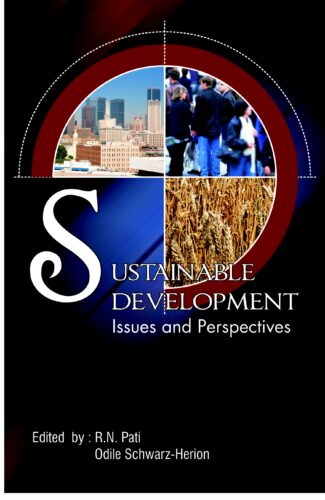
It is realised that the synergy between local knowledge and development efforts would ensure the achievement of Millennium Development Goals. This book is an outcome of explorative research conducted on the issues of Sustainable Development by scientists of various research institutes and universities of India and abroad.
Sustainable Development is a major thrust area adopted for all development interventions initiated by different National Governments of the world as a follow up initiatives to resolutions of Millennium Development Goals (MDGs). The First Global Knowledge Conference at Toronto (1997) encouraged world leaders, policy makers, scientists and civil society representatives of developing countries to focus more on community-based knowledge systems and development practices and incorporate them in ongoing development initiatives for achievement of Sustainable Development. It is realised that the synergy between local knowledge and development efforts would ensure the achievement of MDGs. The forces of globalisation have affected the indigenous communities and their empowerment process in different parts of the globe. In 1998, World Bank for the first time launched the indigenous knowledge for development programme to explore local knowledge systems and development practices and integrate the best practices into the framework of Sustainable Development. Linking indigenous knowledge with Sustainable Development has been experimented across different regions of the globe. This book is an outcome of explorative research conducted on the issues of Sustainable Development by scientists of various research institutes and universities of India, Malaysia, Portugal, Switzerland, U.S.A. and Romania. It is recognized that the economic benefits and incentives associated with indigenous practices would ensure preservation of local knowledge and achievement of Sustainable Development.

The book meticulously deals with the socio-economic, political and cultural facets of the Kela life, their problems in life and how they solve them. It uncovers the romantic life of the Kelas, their family organization, gender issues, the significance and impact of their leadership and caste panchayats, their free love and divorce practices, and their simple but unique lifestyle.
This monograph provides a vivid socio-economic account of a nomadic community, the Sapua Kelas or the snake-charmers of Orissa. Of all the nomadic castes and communities of Orissa, the Sapua Kelas have, perhaps, a unique traditional social organization and interesting lifestyle. Amidst the sweeping social, economic and political changes, the Kela community has retained its features of traditional caste system and is undergoing a process of social mobility which is closely related to the traditional caste system where both endogenic and exogenic factors come to play.
The book meticulously deals with the social, economic, political and cultural facets of the Kela life, their problems in life and how they solve them. It uncovers the romantic life of the Kelas, their family organization, gender issues, the significance and impact of their leadership and caste panchayats, their harmless deceptive methods for earnings and their simple but unique lifestyle. It also delves deep into the perception of outsiders about the Kela life, especially their free love and of the non-hesitancy of the Kela women in divorcing their life partners.
This, once an untouchable communitys struggle for social mobility, is still an ongoing process. From a nomadic and semi-settled lifestyle, with the advent of the democratic institutions, the Kelas have got a new scope for political and social participation, enabling them to look beyond their traditional occupation of snake-charming, and thus attuning their lifestyle to that of the surrounding population. The book is, therefore, an attempt to show how the nomadic folk society of the Kelas is marching towards the settled life of the Indian peasantry, causing their cultural traits vanishing fast, in favour of the neighbouring culture of the other castes.
The Rabha is an ancient tribal community of the northeast area of India. With both a unique language and religion, they represent an ancient culture continuing to live in modern India; while some aspects of the Hindu religion appear to be assimilated by the community, the author is careful to note that they continue to retain much of their exclusive features, and points out some of those. The author goes to a great depth to present both the religious and social aspects of the Rabha people, and weaves a tapestry of the interrelationships between the two, which serves as the basis for the Rabha life today, as it has also functioned historically. She goes further, pointing out the changes of the Rabha that are occurring in modern Indian society, and points to some influences that modern religions are having on the traditional rituals and rites. With its in-depth study of the unique features of a little-known, ancient society of North East India, the text should be of considerable value for the sociologist, as well as the student of little-known tribal religions; it will also provide a great deal of knowledge to those who are trying to understand the changes that are taking place in modern Indian society, as well as other transitioning nations.
| × |
|
Electrical Power Engineering: Reference & Applications Handbook 1 x ₹7,200.00 |
| × |
|
Kautilya Arthashastra 1 x ₹765.00 |